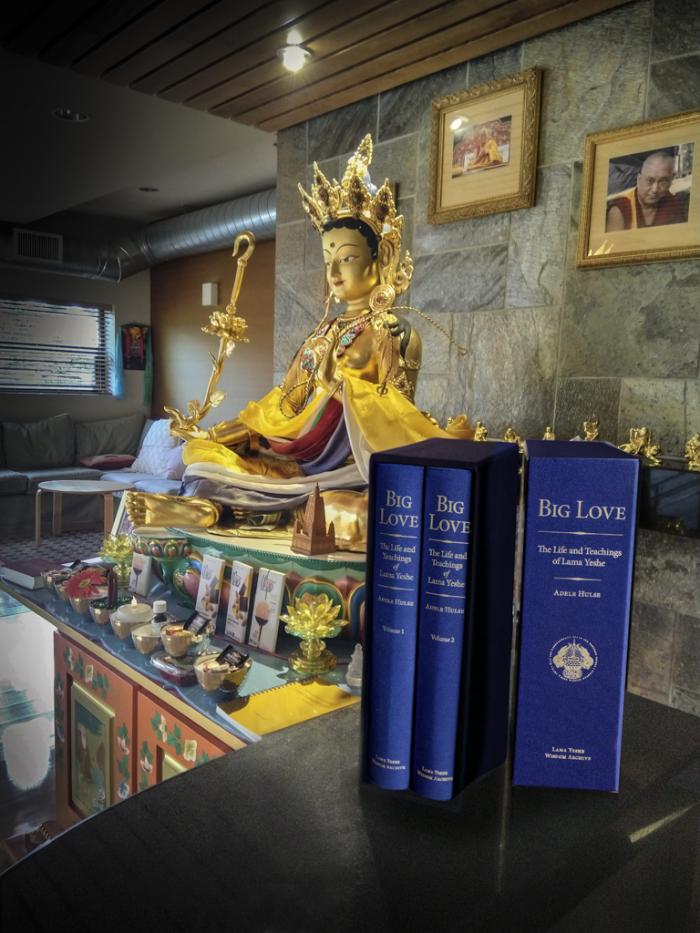Dear Friends,
Thank you for your interest in LYWA’s monthly eletters. Please share this one with anybody you think might be interested. And we are happy to report that all Big Love freight shipments have arrived worldwide and that the books themselves are finally in the hands of their recipients, or will be very soon. If you’ve had an issue receiving your copy, please let us know.
Read on to see what new offerings we have to share with you this month. Enjoy!
THIS MONTH ON the LYWA Podcast: Making Your Mind Vajrayana
So whatever happens, whatever is happening around, around you, your heart has peace.—Lama Zopa Rinpoche
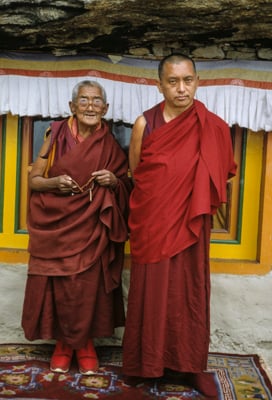 In this month’s podcast, Lama Zopa Rinpoche leads us in the vajra practice of Chenrezig. Rinpoche begins by chanting OM MANI PADME HUM slowly and powerfully. Within that resonance Rinpoche teaches on how to maintain the vajra visualization of Chenrezig where method and wisdom are unified in one mind. Rinpoche also touches upon the vajra method of hearing all sounds as mantra and then leads the group again in chanting OM MANI PADME HUM, this time using the kind of chanting Rinpoche says he would hear his mother use at Lawudo. While chanting Rinpoche repeatedly pauses to refresh the visualization of Chenrezig on the crown of all sentient beings to whom the practice is dedicated. After ending this session of chanting while visualizing mindfully, Rinpoche returns to analyzing the emptiness of Chenrezig and how true existence looks when it is projected on that visualization. Listening to this experiential teaching will both increase your knowledge of the ultimate view and deepen your practice of Chenrezig for the benefit of all. Rinpoche gave this talk in Madrid, Spain on June 10, 2009. You can follow along with the transcript here.
In this month’s podcast, Lama Zopa Rinpoche leads us in the vajra practice of Chenrezig. Rinpoche begins by chanting OM MANI PADME HUM slowly and powerfully. Within that resonance Rinpoche teaches on how to maintain the vajra visualization of Chenrezig where method and wisdom are unified in one mind. Rinpoche also touches upon the vajra method of hearing all sounds as mantra and then leads the group again in chanting OM MANI PADME HUM, this time using the kind of chanting Rinpoche says he would hear his mother use at Lawudo. While chanting Rinpoche repeatedly pauses to refresh the visualization of Chenrezig on the crown of all sentient beings to whom the practice is dedicated. After ending this session of chanting while visualizing mindfully, Rinpoche returns to analyzing the emptiness of Chenrezig and how true existence looks when it is projected on that visualization. Listening to this experiential teaching will both increase your knowledge of the ultimate view and deepen your practice of Chenrezig for the benefit of all. Rinpoche gave this talk in Madrid, Spain on June 10, 2009. You can follow along with the transcript here.
The LYWA podcast contains hundreds of hours of audio, each with links to the accompanying lightly edited transcripts. See the LYWA podcast page to search or browse the entire collection by topic or date, and for easy instructions on how to subscribe.
WHAT'S NEW ON OUR WEBSITE
This month we have posted several lectures by Lama Zopa Rinpoche from the 36th annual meditation course held at Kopan Monastery, Nepal, in 2003. Lightly edited by Gordon McDougall. In these teachings, Rinpoche advises the need for compassion and leads a meditation on universal responsibility. Rinpoche also discusses patience and the shortcomings of desire and anger, and teaches on the suffering of samsara, refuge and bodhicitta, and the yoga of offering food. This month's teaching is an excerpt from these lectures and focuses on anger and the enemy coming from the mind.
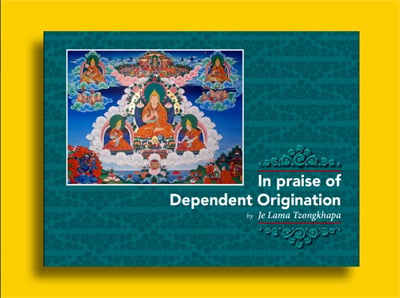 We have also posted two texts, freely available as PDFs which have been beautifully produced by Piero Sirianni, for viewing on your mobile device or computer:
We have also posted two texts, freely available as PDFs which have been beautifully produced by Piero Sirianni, for viewing on your mobile device or computer:In Praise of Dependent Origination, a praise to the Buddha composed by Lama Tsongkhapa after he attained the realization of emptiness. Translated by Geshe Thupten Jinpa. The Creative Play of Wisdom, a praise to Tara composed by Khadro-la (Rangjung Neljorma Khadro Namsel Drönme) at the onset of the COVID-19 pandemic. The prayer has Tibetan, English and Italian translations. English translation by Sean Price.
The Creative Play of Wisdom, a praise to Tara composed by Khadro-la (Rangjung Neljorma Khadro Namsel Drönme) at the onset of the COVID-19 pandemic. The prayer has Tibetan, English and Italian translations. English translation by Sean Price.
And we have new additions to Lama Zopa Rinpoche's Online Advice Book this month to share with you:
- Numberless Buddhas and Bodhisattvas Love You: A student wrote to Rinpoche about their experience in retreat and the grief of losing their mother. Rinpoche recommended more lamrim meditation and explained that the buddhas’ and bodhisattvas’ compassion is limitless.
- How to Think When Offering to Sangha: Rinpoche gave this advice about the unbelievable merit of making offerings to the Sangha when we have the correct motivation.
- Transforming Anxiety and Depression: A person who was experiencing anxiety and depression asked Rinpoche which buddha would be helpful. Rinpoche gave this advice on the good heart and cherishing others.
- How to Follow the Guru Correctly: Rinpoche wrote this letter to a student advising the importance of checking the guru first, and what to do if the guru instructs the disciple to do something which is non-Dharma.
You can always find a list of all the newly posted advices from Lama Zopa Rinpoche on our website.
Big Love Reader Feedback
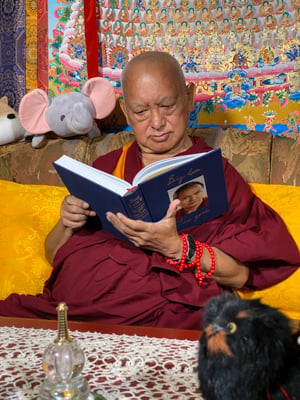 We are delighted to share with you some of the wonderful feedback from readers who have received their copy of Big Love. Visit our new webpage, What People Are Saying About Big Love, to read the comments about this amazing book.
We are delighted to share with you some of the wonderful feedback from readers who have received their copy of Big Love. Visit our new webpage, What People Are Saying About Big Love, to read the comments about this amazing book.
If you have not ordered your copy yet you can do so here. And if you need more convincing please check out this multimedia presentation based on a chapter from Volume 1 in Big Love. The chapter begins in 1969 as the lamas and their early Western students go on pilgrimage to Lawudo and begin to establish Kopan Monastery. Enjoy!
When you do decide to buy a copy, please don't forget to let us know what you think!
Thanks again for reading and sharing these monthly eletters. Please let us know if we can do anything for you.
Big love,

Nick Ribush
Director
THIS MONTH'S TEACHING: THE ENEMY COMES FROM THE MIND
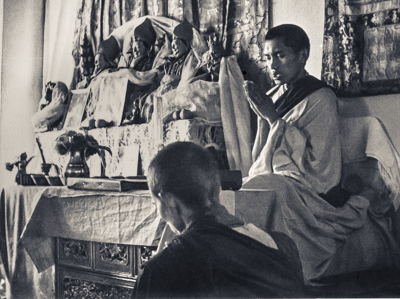 The minute our anger arises, we find an enemy in our life. We see a person that we hate or we want to hurt, or a person harms us and we see them as an enemy. But the minute our anger is gone, we don’t see them as an enemy. Only when anger arises do we see the enemy but the minute the anger is gone, we don’t see them as an enemy.
The minute our anger arises, we find an enemy in our life. We see a person that we hate or we want to hurt, or a person harms us and we see them as an enemy. But the minute our anger is gone, we don’t see them as an enemy. Only when anger arises do we see the enemy but the minute the anger is gone, we don’t see them as an enemy.
We interpret based on their way of thinking, how they behave with their body, their way of speaking. Based on that, we put a negative label on it, that they harmed us and then they are an enemy. Then, we believe in that. We put the label on a situation and then we believe in it. After we believe in it, the person’s action and the person themselves appear bad, harmful. We label them “enemy” and we believe in that and after that they appear back to us as an enemy. Only after our mind labels “bad” and we believe in our label, do that person’s action and that person appear to us as bad. Then it creates, by seeing that, by contacting that, the feeling that we get is an unpleasant feeling—not pleasant but unpleasant feeling—so we become unhappy.
From this, we can see very clearly that the enemy is the view of anger. That’s why when the anger has gone, we don’t have that view of an enemy. First our own mind interprets, negatively labeling “bad” to the action and the person. It does not appear like that, however. The person disturbs us, we put that negative label on the situation, we believe in it, and then anger arises. Believing in that negative label that has been imputed by our mind, we get angry, we experience all these unpleasant feelings. Before, we didn’t have a problem. Because there was no problem before the mind labeled it, it’s very clear that it came from our mind. It came from our mind. It is solely the creation of our own mind, by putting a negative label on it and believing in that.
So, we get angry, and then that makes the other person get angry with us, they are unhappy with us. Not only do we create negative karma but our anger also causes the other person to create negative karma by getting angry, destroying the peace and happiness within us and the peace and happiness within the other person, replacing it with an unpleasant feeling, which is the problem. Engaging in negative karma creates the cause to reincarnate in the hells or as a hungry ghost or animal. It brings not only unhappiness in this life but even in the future life when we are born as a human being again, where we will have to experience the consequences of this negative action. The effect of this even in the future life when we are born as a human being is that we have to experience many problems.
That person’s attitude to us didn’t change—whatever their attitude, angry or whatever, it is the same. From the other person’s side—their behavior, their attitude—nothing has changed.
The next way of thinking is that instead of that person’s action causing us to get angry, we can think that it’s kind. Instead of seeing it as harm, we can think that their anger toward us is a special favor they have done for us, a special kindness. It is something very particular, very special. If we don’t practice patience but always let the anger arise, we will always create suffering. Rather than giving ourselves the victory, we give the victory to anger, always letting ourselves be dictated to by anger, letting ourselves be abused by anger. We always let ourselves be used by anger, like a slave. We become a slave to anger, being dictated to by anger. If we don’t practice patience, if we let anger arise, this is what happens. If we give in to anger, instead of giving victory, freedom, to ourselves, we are giving victory, freedom, to anger and we are letting ourselves be overwhelmed, possessed, by anger.
In the world, people don’t like dictators. They complain about them; they don’t like them. And also, instead of bringing peace and happiness, they bring so much suffering. This is similar; we let anger dictate to us. There is not one single benefit from anger, not one single benefit, only destruction. We destroy our merits, the cause of happiness. The cause of happiness is only virtue, merit, and that is destroyed by anger. Whatever little we have gets destroyed by anger, what we receive is only harm and what the other person receives from that is only harm.
If we don’t practice patience but always let anger arise, then even our most beloved friend can become our enemy at any time. Even our most beloved friend—the person closest to us in our life—can become our enemy at any time because we can get angry at them, since we don’t practice patience. Our anger can turn our closest friend into an enemy at any time, so there is no question it can do it to others. In that way, we make the other person unhappy, we desert the other person and then the relationship doesn’t last. There is no harmony in the relationship. There is no peace and happiness in the relationship. It makes the other person think more and more about leaving. Finding our character difficult, this thought of leaving arises in the heart.
The day that happens—the day our friend speaks out and leaves us—the pain and the grudge from that day stays there in our heart for years. For years and years, the pain stays there. And every time we remember the situation, tears come out; we feel very sad and disturbed. Even if the person who is closest to us in our life, our beloved friend, can make us angry, there is no question about other people who try to harm us.
Therefore, if we don’t try to change our mind, if we don’t try to change ourselves to become a better person now, when will we? Now, we have this precious human body, which gives all the opportunity to develop all the good qualities, such as patience, wisdom, compassion, loving kindness, universal responsibility. Only now is the chance to develop, to generate all these basic good qualities of the human mind; there is all the opportunity that this human body gives, this human body we won’t have for a long time. How long we will have this precious human body is only a very short time. Its duration is like a flash of lightning. When it’s dark, then suddenly a flash of lightning appears and it is gone. Or like last night’s dream—it appears but it’s gone. How long we have this precious human body is a very short time. It gives us all the opportunity to be better, to develop our mind on the spiritual path.
If we can’t develop this quality of a good heart during this brief lifetime, while we have this precious human body, then it will be impossible when we have an animal’s body or some other rebirth. Developing these qualities, let alone the higher achievements, liberation, the freedom from suffering forever, and finally achieving full enlightenment, if it doesn’t happen during this time when we have this precious human body which gives us all these opportunities, if we miss out on this by not practicing, once we lose this precious human body it will be extremely difficult to regain the opportunity.
This teaching was given by Lama Thubten Zopa Rinpoche at the 36th Kopan Meditation Course, held at Kopan Monastery, Nepal, in 2003. The transcript was lightly edited by Gordon McDougall. You can find and read the entire teaching here.























